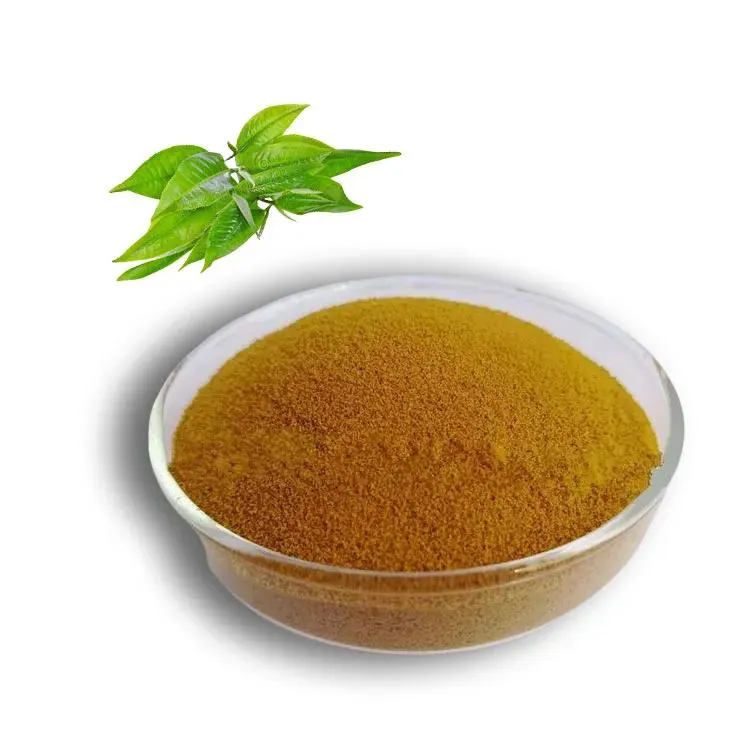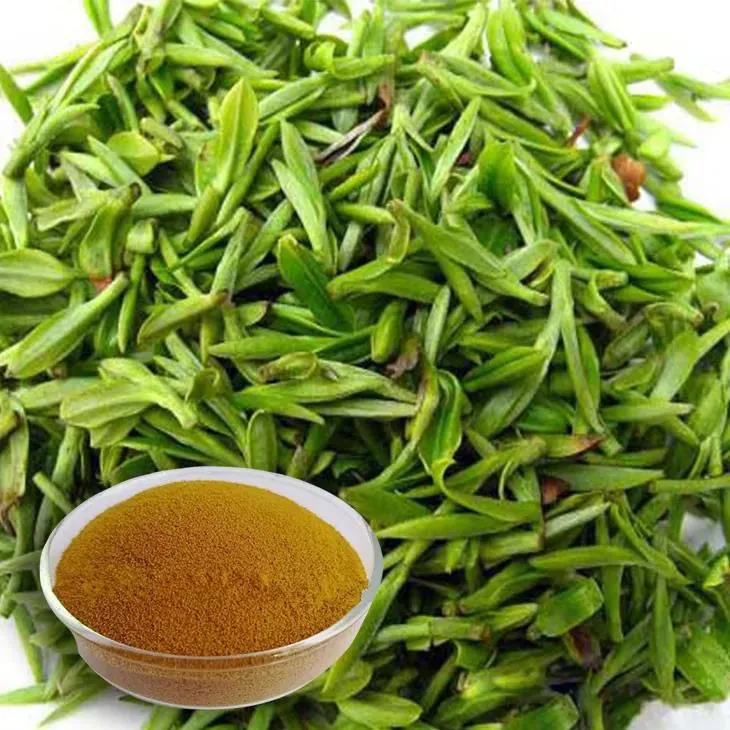- 0086-571-85302990
- sales@greenskybio.com
Green tea extract: What are its benefits and how to take it?
2024-11-14

1. Introduction
Green tea has been a popular beverage for centuries, especially in Asian cultures. However, in recent years, Green Tea Extract has emerged as a concentrated form of the beneficial components found in green tea. This extract is being widely studied and used for its potential health - promoting properties. It is important to understand what Green Tea Extract is, what benefits it can offer, and how to take it safely and effectively.

2. What is Green Tea Extract?
Green tea extract is a concentrated form of green tea. It is made by processing the leaves of the Camellia sinensis plant, which is the same plant used to make traditional green tea. The extraction process isolates and concentrates the active compounds in green tea, such as catechins, polyphenols, and flavonoids. The most well - known and studied catechin in green tea extract is epigallocatechin - 3 - gallate (EGCG). EGCG is a powerful antioxidant that is believed to be responsible for many of the health benefits associated with green tea extract.

3. Health benefits of green tea extract
3.1 Antioxidant properties
One of the main benefits of green tea extract is its antioxidant activity. Antioxidants are substances that can neutralize harmful free radicals in the body. Free radicals are unstable molecules that can cause oxidative stress, which is linked to various health problems such as aging, cancer, and heart disease. The catechins in green tea extract, especially EGCG, are potent antioxidants. They can scavenge free radicals and protect cells from oxidative damage.
For example, in a study, researchers found that green tea extract was able to reduce oxidative stress markers in the body. This suggests that it may help prevent or slow down the development of diseases related to oxidative stress.
3.2 Heart health
Green tea extract may also be beneficial for heart health. There are several ways in which it can impact the cardiovascular system:
- Cholesterol levels: It may help improve cholesterol profiles. Some studies have shown that green tea extract can increase levels of "good" HDL cholesterol and reduce levels of "bad" LDL cholesterol. For instance, a clinical trial found that participants who took green tea extract supplements for a certain period had a significant reduction in LDL cholesterol levels compared to those who took a placebo.
- Blood pressure: Green tea extract may also play a role in regulating blood pressure. It has been shown to have a mild hypotensive effect in some individuals. This could be due to its ability to relax blood vessels, allowing for better blood flow and reduced pressure on the arterial walls.
3.3 Weight management
For those interested in weight management, green tea extract may offer some assistance.
- Metabolism boost: Green tea extract has been shown to increase metabolic rate. This means that the body burns calories at a faster rate, even at rest. The catechins in the extract, particularly EGCG, are thought to play a role in this process by interacting with the body's thermogenesis mechanism. Thermogenesis is the process by which the body generates heat, and an increase in thermogenesis can lead to increased calorie burning.
- Fat oxidation: It may also enhance fat oxidation. In other words, it helps the body break down stored fat and use it for energy. Some research has suggested that green tea extract can increase the activity of enzymes involved in fat metabolism.
3.4 Anti - inflammatory effects
Chronic inflammation is associated with many diseases, including arthritis, diabetes, and certain cancers. Green tea extract has anti - inflammatory properties. The catechins in it can inhibit the production of inflammatory mediators in the body. For example, in vitro studies have shown that EGCG can suppress the activity of certain inflammatory cytokines. This anti - inflammatory effect may help in reducing the risk of developing chronic inflammatory diseases and may also be beneficial for those already suffering from such conditions in terms of managing symptoms.
3.5 Potential cancer - fighting properties
While more research is needed, there is some evidence to suggest that green tea extract may have potential anti - cancer properties.
- Cell growth inhibition: Some studies have shown that the catechins in green tea extract can inhibit the growth of cancer cells in vitro and in animal models. For example, EGCG has been shown to interfere with the cell cycle of cancer cells, preventing them from dividing and multiplying uncontrollably.
- Antioxidant protection: The antioxidant activity of green tea extract may also play a role in cancer prevention. By reducing oxidative stress, it may help protect cells from DNA damage that can lead to cancer development.
3.6 Brain health
Green tea extract may also have positive effects on brain health.
- Neuroprotection: The antioxidants in green tea extract can protect brain cells from oxidative damage. This may be beneficial in preventing neurodegenerative diseases such as Alzheimer's and Parkinson's. Some animal studies have shown that green tea extract can improve cognitive function and reduce the accumulation of amyloid - beta plaques, which are characteristic of Alzheimer's disease.
- Mood enhancement: There is also some evidence to suggest that green tea extract may have a positive impact on mood. It may help reduce stress and anxiety levels, perhaps through its interaction with neurotransmitters in the brain.

4. Forms of green tea extract
Green tea extract is available in several forms, each with its own advantages and considerations:
- Capsules: These are a convenient way to take green tea extract. They typically contain a measured dose of the extract, making it easy to control the amount consumed. Capsules are also easy to store and can be taken on the go.
- Powders: Green tea extract powder can be added to various beverages or foods. It can be mixed with water, juice, or smoothies. However, it may require some measurement and mixing to ensure the correct dosage.
- Liquid extracts: Liquid forms of green tea extract are also available. They can be taken directly or added to drinks. Liquid extracts may be absorbed more quickly by the body compared to capsules or powders, but they may also have a stronger taste.
5. How to take green tea extract
5.1 Dosage
The appropriate dosage of green tea extract can vary depending on factors such as age, health status, and the specific purpose of taking it. In general, for most health - promoting purposes, a dosage of 200 - 300 mg per day of green tea extract, which contains a significant amount of EGCG, is often recommended. However, it's important to follow the instructions on the product label or consult a healthcare professional.
Excessive intake of green tea extract can have side effects, which will be discussed in the next section. It's crucial not to exceed the recommended dosage without medical supervision.
5.2 Timing
There is no strict rule regarding the timing of taking green tea extract. However, some people prefer to take it in the morning to potentially boost metabolism throughout the day. Others may choose to take it before exercise to enhance fat burning. It can be taken with or without food, although taking it with food may help reduce the risk of any potential stomach upset.
5.3 Precautions
While green tea extract has many potential benefits, there are also some precautions to keep in mind:
- Side effects: Excessive intake of green tea extract can lead to side effects such as nausea, vomiting, stomach cramps, and insomnia. In some cases, it may also interact with certain medications. For example, it may interfere with the effectiveness of blood - thinning medications.
- Quality and purity: When choosing a green tea extract product, it's important to ensure its quality and purity. Look for products from reputable manufacturers that are tested for contaminants and have a high content of active ingredients.
- Allergies: Some people may be allergic to green tea or its components. If you have a known allergy to tea or related plants, it's best to avoid green tea extract.
6. Conclusion
Green tea extract offers a wide range of potential health benefits, from antioxidant protection to support for heart health, weight management, and more. It is available in different forms, and when taken correctly, it can be a valuable addition to a healthy lifestyle. However, it's important to be aware of the proper dosage, potential side effects, and take necessary precautions. As with any supplement, it's always a good idea to consult a healthcare professional before starting to take green tea extract, especially if you have pre - existing health conditions or are taking other medications.
FAQ:
1. What are the main antioxidants in green tea extract?
The main antioxidants in green tea extract are catechins, with epigallocatechin - 3 - gallate (EGCG) being a particularly important one. These antioxidants play a crucial role in combating oxidative stress in the body.
2. How does green tea extract support heart health?
Green tea extract may support heart health by improving cholesterol levels and blood pressure. The antioxidants and other compounds in it can have positive effects on these aspects, which are important factors for a healthy heart.
3. Can green tea extract really help with weight management?
Yes, it could potentially help with weight management. Green tea extract may boost metabolism, which can contribute to burning more calories. However, it should be used in conjunction with a healthy diet and regular exercise for optimal results.
4. What are the different forms of green tea extract available?
Green tea extract is available in various forms such as capsules, powders, and liquid extracts. Each form has its own advantages, and the choice may depend on personal preference and convenience.
5. Are there any side effects of taking green tea extract?
Yes, if taken in excessive amounts, green tea extract may have side effects. These can include digestive issues, insomnia, and increased heart rate in some cases. It is important to follow the proper dosage.
Related literature
- The Health Benefits of Green Tea Extract: A Comprehensive Review"
- "Green Tea Extract and Cardiovascular Health: Recent Findings"
- "Green Tea Extract in Weight Management: Mechanisms and Efficacy"
- ▶ Hesperidin
- ▶ Citrus Bioflavonoids
- ▶ Plant Extract
- ▶ lycopene
- ▶ Diosmin
- ▶ Grape seed extract
- ▶ Sea buckthorn Juice Powder
- ▶ Fruit Juice Powder
- ▶ Hops Extract
- ▶ Artichoke Extract
- ▶ Mushroom extract
- ▶ Astaxanthin
- ▶ Green Tea Extract
- ▶ Curcumin
- ▶ Horse Chestnut Extract
- ▶ Other Product
- ▶ Boswellia Serrata Extract
- ▶ Resveratrol
- ▶ Marigold Extract
- ▶ Grape Leaf Extract
- ▶ New Product
- ▶ Aminolevulinic acid
- ▶ Cranberry Extract
- ▶ Red Yeast Rice
- ▶ Red Wine Extract
-
Chasteberry Extract
2024-11-14
-
Saw Palmetto Extract
2024-11-14
-
Feverfew Extract
2024-11-14
-
Diosmin
2024-11-14
-
Konjac Powder
2024-11-14
-
Plantain extract
2024-11-14
-
Lavender Extract
2024-11-14
-
Green Tea Extract
2024-11-14
-
Propolis Extract Powder
2024-11-14
-
Almond Extract Powder
2024-11-14




















